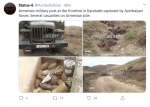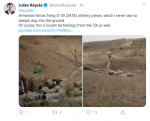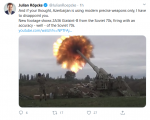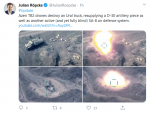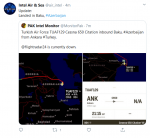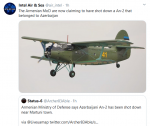You are using an out of date browser. It may not display this or other websites correctly.
You should upgrade or use an alternative browser.
You should upgrade or use an alternative browser.
WAR Main Armenia Versus Azerbaijan War Thread - Open Hostilities Underway Now
- Thread starter WTSR
- Start date
northern watch
TB Fanatic
northern watch
TB Fanatic
northern watch
TB Fanatic
northern watch
TB Fanatic
northern watch
TB Fanatic
northern watch
TB Fanatic
northern watch
TB Fanatic
northern watch
TB Fanatic
northern watch
TB Fanatic
northern watch
TB Fanatic
northern watch
TB Fanatic
northern watch
TB Fanatic
northern watch
TB Fanatic
Anyone here know whether we still have our nukes at that Turkish base, yet? If so that could lead to big problems!
I have not heard whether we still have our nukes at the Incirlik Air Base, Turkish special forces could seize them. Turkish engineers and scientists are smart enough to take control of them and give Turkey the bomb.
Melodi
Disaster Cat
Northern watch I don't know if it is just me (in which case I may need to do something) but for some reason,
almost all (but not quite all) of your links show up as broken links (and not just on this thread).
I thought you would want to know because I suspect the information is highly useful.
Oh on another topic - my understanding is that US soldiers are being moved from the base in Turkey to one in either Greece or Cyprus depending on which report you read, but I don't have a link handy.
almost all (but not quite all) of your links show up as broken links (and not just on this thread).
I thought you would want to know because I suspect the information is highly useful.
Oh on another topic - my understanding is that US soldiers are being moved from the base in Turkey to one in either Greece or Cyprus depending on which report you read, but I don't have a link handy.
northern watch
TB Fanatic
Northern watch I don't know if it is just me (in which case I may need to do something) but for some reason,
almost all (but not quite all) of your links show up as broken links (and not just on this thread).
I thought you would want to know because I suspect the information is highly useful.
Oh on another topic - my understanding is that US soldiers are being moved from the base in Turkey to one in either Greece or Cyprus depending on which report you read, but I don't have a link handy.
Melodi,
You are not the first person to report this to me, try waiting and they will show up
Try "right-clicking the "question mark" image, it will open it in a new stand-alone tab, and the correct image will appear - but slow to load"
Melodi
Disaster Cat
Thanks, I wasn't picking on you I wanted to see what your were posting I will try this!Melodi,
You are not the first person to report this to me, try waiting and they will show up
Try "right-clicking the "question mark" image, it will open it in a new stand-alone tab, and the correct image will appear - but slow to load"
northern watch
TB Fanatic
Thanks, I wasn't picking on you I wanted to see what your were posting I will try this!
The issue is with video files, not screen shots, maybe an issue for Dennis to look into?
northern watch
TB Fanatic
Armenia-Azerbaijan Conflict Ignites Again in Karabakh
Publication: Eurasia Daily Monitor Volume: 17 Issue: 134
By: Vasif Huseynov
Jamestown.org
September 28, 2020 04:58 PM Age: 6 mins
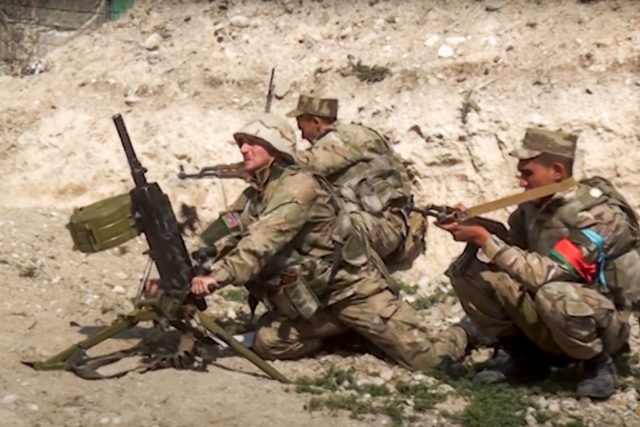
(Source: Azerbaijani MoD)
The decades-long conflict between Armenia and Azerbaijan escalated again, on September 27, with the second intense military confrontation in three months. According to the Ministry of Defense of Azerbaijan, at about six o’clock in the morning, the Armenian Armed Forces commenced a large-scale provocation and fired on positions of the Azerbaijani Army as well as civilian settlements in the Karabakh frontline zone. The attack utilized large-caliber weapons, mortars and artillery of various calibers (APA, September 27).
Unlike the previous large-scale clashes in mid-July of this year, which started along the state border between Armenia and Azerbaijan and was mostly limited to the Tovuz/Tavush regions of the sides (see EDM, July 14), the military exchanges that erupted this time around occurred in Azerbaijan’s occupied Karabakh region and covered a wider area. The Azerbaijani defense ministry reported that the first shelling began in areas surrounding Tartar, Aghdam, Fuzuli and Cabrayil (APA, September 27). In its “counter-offensive operation along the entire front,” Azerbaijan mobilized personnel and tank units with the support of missile and artillery troops, front-line aviation and unmanned aerial vehicles (UAV), the ministry’s press release read (Azertag, September 27).
The recent confrontation followed warnings by the Azerbaijani side about Armenia’s preparation for a large-scale conflict. In a September 19 interview with local television channels, Azerbaijan’s President Ilham Aliyev stated that Armenia was “preparing for a new war. They are concentrating their forces near the line of contact [in Karabakh]… We follow their actions. Of course, we will defend ourselves” (APA, September 19). Both sides had been on alert for a new escalation since the July clashes, conducting intensive military exercises with their external allies (see EDM, August 14; Asbarez, July 24).
In turn, blaming Azerbaijan for the start of the hostilities, the Armenian authorities announced on the morning of September 27 that “the Azerbaijani army attacked the entire length of the line of contact with rocket-propelled grenade launchers and missile strikes” (Panorama.am, September 27). At this stage, it is not clear which side’s version of the latest outbreak of violence is more plausible. Yet a certain level of preparation on the Armenian side—namely, multiple Russian arms shipments to the country via heavy transport flights (see EDM, September 11)—could conspicuously be observed for weeks leading up to the clashes.
Shortly after the outbreak of the fighting on Sunday, Armenia declared martial law and general mobilization (TASS, September 27). Although the State Service for Mobilization and Conscription of Azerbaijan first announced that there was no need for general mobilization at the moment, an extraordinary session of the Azerbaijani parliament later decided to impose martial law in some cities and regions of the country (Azertag, APA, September 27).
A few hours after the launch of the hostilities, Azerbaijan’s Ministry of Defense declared the liberation of seven villages in Fuzuli and Jabrail districts as well as the recapture of multiple important heights (Azertag, September 27). Most of the captured territories are of crucial strategic importance. In particular, Azerbaijani forces secured visual control over the Vardenis–Aghdara highway, which connects occupied Karabakh with Armenia (Azvision.az, September 27). The highway, completed by Armenia in 2017, adds an alternative to the previously established road connecting Karabakh with the Republic of Armenia, thus facilitating speedier transfers of Armenian military cargo into the occupied Azerbaijani territories. The successful Azerbaijani military operations have now undermined the continued safety of using this path for Armenian forces. At the same time, the recaptured locations will provide Azerbaijan with new strategic positions from which to potentially continue deeper into the occupied territories. The loss of those positions was confirmed by Yerevan, following initial denials (Panorama.am, September 27).
Toward the end of the day, on September 27, Shushan Stepanyan, the press secretary of the Armenian minister of defense, announced that casualties on the Armenian side totaled 16 killed and more than a hundred wounded (Twitter.com/ShStepanyan, September 27). Azerbaijan offered no official information on numbers of its killed or wounded troops, but the defense ministry did note it was verifying reports of civilian casualties (Azeridefence.com, September 27).
As soon as news emerged of the latest Azerbaijani-Armenian escalation, multiple states and international organizations called on the conflicting forces to return to an immediate ceasefire. Russian Foreign Minister Sergei Lavrov, in a telephone conversation with his Armenian counterpart, Zohrab Mnatsakanyan, called for an end to the fighting and declared that Moscow would continue its mediation efforts (Mid.ru, September 27). Meanwhile, just as it did following the July clashes, Turkey again expressed strong support to Azerbaijan through multiple channels. The Turkish Ministry of Foreign Affairs assured that Ankara is ready to assist Baku in any way the latter might request (TRT, September 27).
The Organization for Security and Cooperation in Europe’s (OSCE) Minsk Group, the main international mission tasked with the mediation of peace negotiations between Armenia and Azerbaijan and co-chaired by Russia, France and the United States, called for a “return to the ceasefire and resumption of substantive negotiations” (Osce.org, September 27). Earlier this year, the Armenian government rejected the so-called Madrid Principles, the major conflict resolution mechanism proposed by the Minsk Group (Aysor, September 27). In 2019, the efforts of the institution were further complicated by the Armenian defense ministry’s adoption of the “new war for new territories” concept as well as Armenian Prime Minister Nikol Pashinyan’s call for the unification of Armenia and Karabakh (Asbarez, April 1, 2019; EurasiaNet, August 6, 2019).
Against this backdrop, the languorous approach of the Minsk Group to the conflict has come under extensive and increasing criticism in Azerbaijan, both by the government and the general public. Most recently, Azerbaijanis were outraged by the relatively passive reaction of the institution to what they considered incendiary moves on the part of the Armenians. These provocations included an announced plan to move the “capital” of the occupying regime in Karabakh to the historical town of Shusha, which holds profound cultural importance for Azerbaijanis, as well as the illegal settlement of Lebanese-Armenians in the occupied Azerbaijani territories (EurasiaNet, September 21; see EDM, September 23). The last three decades of failed negotiations have discredited the peace process for many inside Azerbaijan and Armenia alike, leading to growing warnings that the status quo will lead to the further intensification of the conflict.
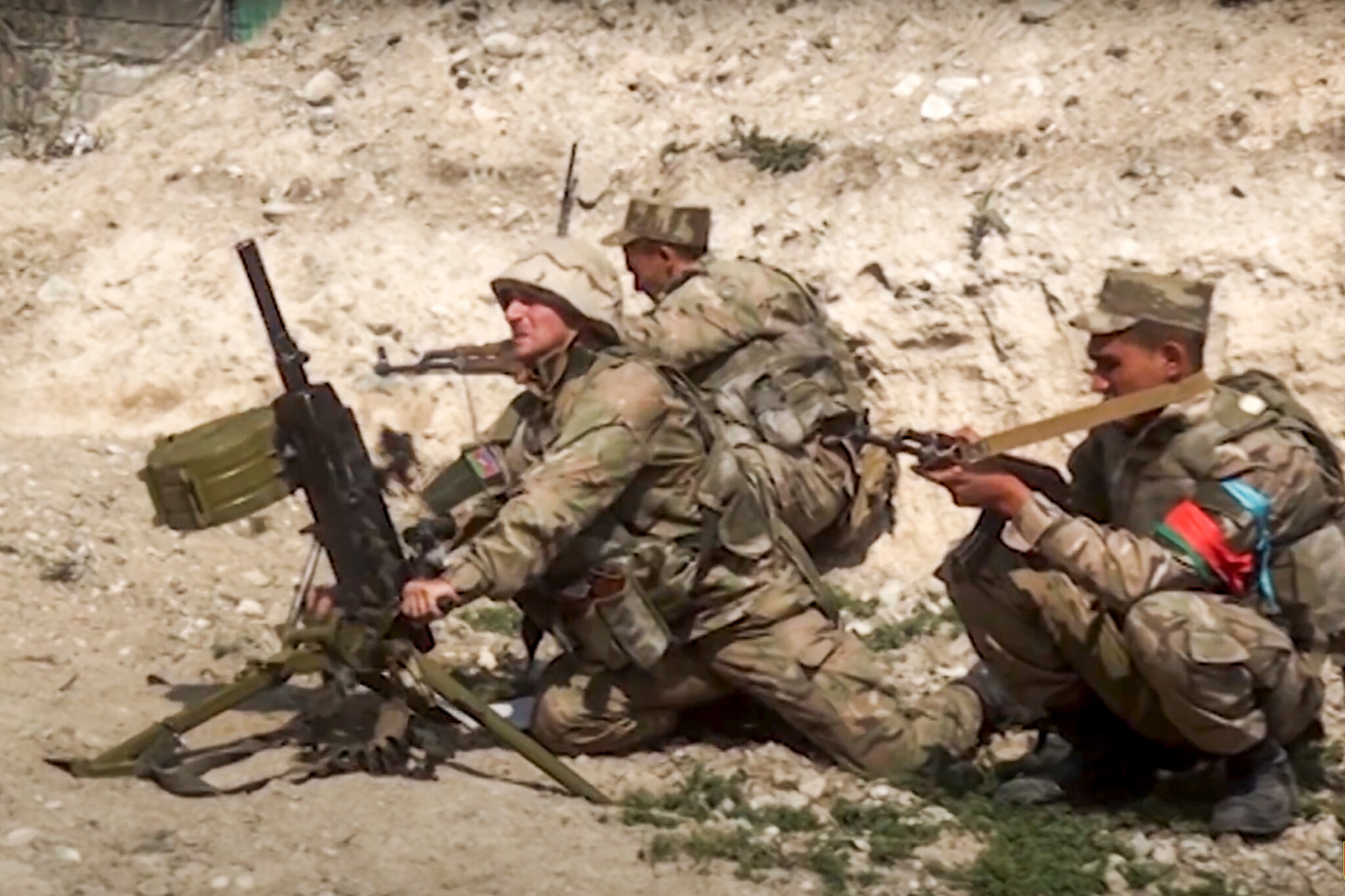
 jamestown.org
jamestown.org
Publication: Eurasia Daily Monitor Volume: 17 Issue: 134
By: Vasif Huseynov
Jamestown.org
September 28, 2020 04:58 PM Age: 6 mins

(Source: Azerbaijani MoD)
The decades-long conflict between Armenia and Azerbaijan escalated again, on September 27, with the second intense military confrontation in three months. According to the Ministry of Defense of Azerbaijan, at about six o’clock in the morning, the Armenian Armed Forces commenced a large-scale provocation and fired on positions of the Azerbaijani Army as well as civilian settlements in the Karabakh frontline zone. The attack utilized large-caliber weapons, mortars and artillery of various calibers (APA, September 27).
Unlike the previous large-scale clashes in mid-July of this year, which started along the state border between Armenia and Azerbaijan and was mostly limited to the Tovuz/Tavush regions of the sides (see EDM, July 14), the military exchanges that erupted this time around occurred in Azerbaijan’s occupied Karabakh region and covered a wider area. The Azerbaijani defense ministry reported that the first shelling began in areas surrounding Tartar, Aghdam, Fuzuli and Cabrayil (APA, September 27). In its “counter-offensive operation along the entire front,” Azerbaijan mobilized personnel and tank units with the support of missile and artillery troops, front-line aviation and unmanned aerial vehicles (UAV), the ministry’s press release read (Azertag, September 27).
The recent confrontation followed warnings by the Azerbaijani side about Armenia’s preparation for a large-scale conflict. In a September 19 interview with local television channels, Azerbaijan’s President Ilham Aliyev stated that Armenia was “preparing for a new war. They are concentrating their forces near the line of contact [in Karabakh]… We follow their actions. Of course, we will defend ourselves” (APA, September 19). Both sides had been on alert for a new escalation since the July clashes, conducting intensive military exercises with their external allies (see EDM, August 14; Asbarez, July 24).
In turn, blaming Azerbaijan for the start of the hostilities, the Armenian authorities announced on the morning of September 27 that “the Azerbaijani army attacked the entire length of the line of contact with rocket-propelled grenade launchers and missile strikes” (Panorama.am, September 27). At this stage, it is not clear which side’s version of the latest outbreak of violence is more plausible. Yet a certain level of preparation on the Armenian side—namely, multiple Russian arms shipments to the country via heavy transport flights (see EDM, September 11)—could conspicuously be observed for weeks leading up to the clashes.
Shortly after the outbreak of the fighting on Sunday, Armenia declared martial law and general mobilization (TASS, September 27). Although the State Service for Mobilization and Conscription of Azerbaijan first announced that there was no need for general mobilization at the moment, an extraordinary session of the Azerbaijani parliament later decided to impose martial law in some cities and regions of the country (Azertag, APA, September 27).
A few hours after the launch of the hostilities, Azerbaijan’s Ministry of Defense declared the liberation of seven villages in Fuzuli and Jabrail districts as well as the recapture of multiple important heights (Azertag, September 27). Most of the captured territories are of crucial strategic importance. In particular, Azerbaijani forces secured visual control over the Vardenis–Aghdara highway, which connects occupied Karabakh with Armenia (Azvision.az, September 27). The highway, completed by Armenia in 2017, adds an alternative to the previously established road connecting Karabakh with the Republic of Armenia, thus facilitating speedier transfers of Armenian military cargo into the occupied Azerbaijani territories. The successful Azerbaijani military operations have now undermined the continued safety of using this path for Armenian forces. At the same time, the recaptured locations will provide Azerbaijan with new strategic positions from which to potentially continue deeper into the occupied territories. The loss of those positions was confirmed by Yerevan, following initial denials (Panorama.am, September 27).
Toward the end of the day, on September 27, Shushan Stepanyan, the press secretary of the Armenian minister of defense, announced that casualties on the Armenian side totaled 16 killed and more than a hundred wounded (Twitter.com/ShStepanyan, September 27). Azerbaijan offered no official information on numbers of its killed or wounded troops, but the defense ministry did note it was verifying reports of civilian casualties (Azeridefence.com, September 27).
As soon as news emerged of the latest Azerbaijani-Armenian escalation, multiple states and international organizations called on the conflicting forces to return to an immediate ceasefire. Russian Foreign Minister Sergei Lavrov, in a telephone conversation with his Armenian counterpart, Zohrab Mnatsakanyan, called for an end to the fighting and declared that Moscow would continue its mediation efforts (Mid.ru, September 27). Meanwhile, just as it did following the July clashes, Turkey again expressed strong support to Azerbaijan through multiple channels. The Turkish Ministry of Foreign Affairs assured that Ankara is ready to assist Baku in any way the latter might request (TRT, September 27).
The Organization for Security and Cooperation in Europe’s (OSCE) Minsk Group, the main international mission tasked with the mediation of peace negotiations between Armenia and Azerbaijan and co-chaired by Russia, France and the United States, called for a “return to the ceasefire and resumption of substantive negotiations” (Osce.org, September 27). Earlier this year, the Armenian government rejected the so-called Madrid Principles, the major conflict resolution mechanism proposed by the Minsk Group (Aysor, September 27). In 2019, the efforts of the institution were further complicated by the Armenian defense ministry’s adoption of the “new war for new territories” concept as well as Armenian Prime Minister Nikol Pashinyan’s call for the unification of Armenia and Karabakh (Asbarez, April 1, 2019; EurasiaNet, August 6, 2019).
Against this backdrop, the languorous approach of the Minsk Group to the conflict has come under extensive and increasing criticism in Azerbaijan, both by the government and the general public. Most recently, Azerbaijanis were outraged by the relatively passive reaction of the institution to what they considered incendiary moves on the part of the Armenians. These provocations included an announced plan to move the “capital” of the occupying regime in Karabakh to the historical town of Shusha, which holds profound cultural importance for Azerbaijanis, as well as the illegal settlement of Lebanese-Armenians in the occupied Azerbaijani territories (EurasiaNet, September 21; see EDM, September 23). The last three decades of failed negotiations have discredited the peace process for many inside Azerbaijan and Armenia alike, leading to growing warnings that the status quo will lead to the further intensification of the conflict.

Armenia-Azerbaijan Conflict Ignites Again in Karabakh
The decades-long conflict between Armenia and Azerbaijan escalated again, on September 27, with the second intense military confrontation in three months. According to the Ministry of Defense of Azerbaijan, at about six o’clock in the morning, the Armenian Armed Forces commenced a large-scale...
Last edited:
northern watch
TB Fanatic
Azerbaijani President Rebukes Putin Over Russian Military Cargo Deliveries to Armenia
Publication: Eurasia Daily Monitor Volume: 17 Issue: 125
By: Rahim Rahimov
Jamestown.org
September 11, 2020 04:59 PM Age: 2 weeks
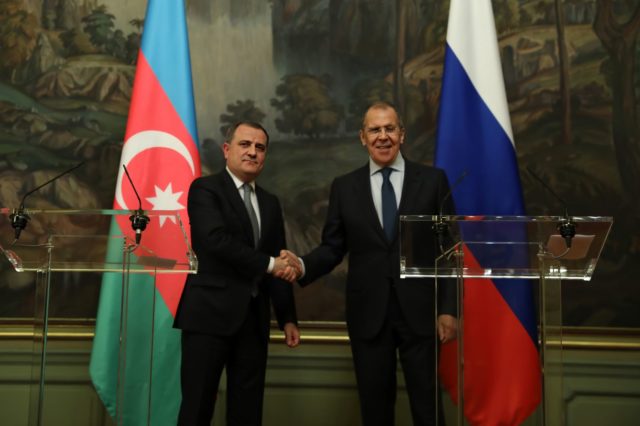

Azerbaijani Foreign Minister Jeyhun Bayramov and his Russian counterpart, Sergei Lavrov (Source: mid.ru)
The Kremlin’s website reported, on August 12, that Azerbaijani President Ilham Aliyev had initiated a phone call to congratulate Vladimir Putin on the Russian vaccine against COVID-19 and to discuss bilateral issues. The next day, however, in a wholly unprecedented move, Aliyev’s press service sharply refuted the Russian version: “[T]he main purpose of the phone call was to clarify this issue” concerning “the intensity of delivery of military cargo from Russia to Armenia” since July 17, amidst the border clashes between Armenia and Azerbaijan. The volume of the military cargo exceeded 400 tons and was transported via the airspaces of Kazakhstan, Turkmenistan, and Iran. Neither government offered any indication as to what Putin’s response to Aliyev’s expressed concerns may have been (Kremlin.ru, August 12; President.az, August 13).
On August 25, Russian Defense Minister Sergei Shoigu visited Baku, where he claimed that the flights had been airlifting “construction materials used in large-scale construction work carried out at the 102nd Russian military base in this country [Armenia],” as well as rotating military personnel. Shoigu’s response was met with derision in Azerbaijan (Mod.gov.az, August 25; Turan.az, August 27; Trend.az, August 29).
In turn, Russian Foreign Minister Sergei Lavrov pointedly declared that the catalyst for the July escalation was “the Armenian side’s decision to reanimate an old border checkpoint located 15 kilometers from Azerbaijani [oil and natural gas] export pipelines,” thus essentially echoing Azerbaijan’s narrative that Armenia had provoked the clash. Nonetheless, for Baku, Shoigu’s and Lavrov’s statements represented another Russian attempt to appease Azerbaijan with words but without matching deeds. Indeed, the observed military deliveries to Armenia continued, exceeding 510 tons even after Baku raised its objections with Moscow (Mid.ru, August 21; Musavat.az, August 24).
Azerbaijani media outlets, parliamentarians, experts and state officials jumped on the bandwagon to denounce Russia’s behavior in relation to the Karabakh conflict in unusually explicit terms. Some expressed appreciation for Tbilisi’s refusal to allow for the transit, hence compelling Moscow to take a more circuitous, 2,000-kilometer-long route, rather than a more direct, 500-kilometer route flying over Georgian territory. But the countries that allowed the Russian overflights were largely ignored. The military aircraft also made trips between Yerevan and Kuwait/Syria. The Syrian flights sparked particular uproar in Baku, leading to claims they were being conducted to engage in illegal arms sales and the resettlement of Middle Eastern Armenians in Karabakh. Other Azerbaijani commentators, however, argued that the ethnic-Armenian refugees would not have been interested in relocation from one conflict zone to another. Therefore, some suggested that Syria’s and Lebanon’s Armenians were being transferred to join the Armenian Armed Forces as the country suffers from demographic decline and a related shortage of soldiers. This claim drew inspiration from Yerevan’s recent draft law to form a 100,000-strong voluntary army as well as the Armenian government’s actual policy to resettle Lebanese-based and other Armenians in the country (Aztv.az, Kommersant, Jam-news.net, September 1; Trend.az, September 2 EurasiaNet, September 3; Day.az, August 7; Baku.ws, Qafqazinfo.az, August 14; Tert.am, August 25).
In response, the popular Russian newspaper Nezavisimaya Gazeta published an article titled “Syrian Fighters in Azerbaijan Prepare for Blitzkrieg Against Armenia,” full of allegations against Baku (Nezavisimaya Gazeta, September 1). Such mutual accusations symptomize the seriousness of the current tensions between Baku and Moscow, which also reverberated in exchanged remarks between the Azerbaijani and Russian foreign ministers in Moscow on August 26.
Namely, Azerbaijani Foreign Minister Jeyhun Bayramov called on Russia to press Armenia to live up to its obligations under the United Nations Security Council resolutions and de-occupy Azerbaijani territories. But Lavrov deflected by asserting that the “immediate task” of those UN resolutions had been “to stop the war then.” He also stated that the Minsk Group co-chairs will not write a scenario for the conflict settlement but only facilitate a positive atmosphere for the negotiations, leaving it to Armenia and Azerbaijan to settle their differences on mutually agreed terms (Mid.ru, August 26). Russian expert Stanislav Tarasov termed Lavrov’s remarks a “diplomatic attack” against Baku. Though, Russian scholar Sergey Markedonov clarifies that the Kremlin is not interested in actively “push[ing] Baku” unless Azerbaijan chooses “Euro-Atlantic solidarity” or “escape from Russia” (Regnum, September 1; Carnegie.ru, July 21).
Several possible contributing factors explain the present diplomatic downturn along the Moscow-Baku axis. These factors are interrelated and not mutually exclusive. First and foremost, Turkey and Azerbaijan held massive military exercises in response to Russian-Armenian drills following the July clashes (see EDM, August 14). And those exercises were followed by pronouncements and rallies in Baku urging the Turkish military to create permanent bases in the country, worrying Moscow. Second, Russia’s arms sales to the South Caucasus’s largest importer, Azerbaijan, have decreased in recent years, in favor of purchases from Israel and Turkey. Ankara’s share is set to continue to rise due to the Russian-made equipment’s reported ineffectiveness, in Syria and Libya, against “game-changing” Turkish drones and electronic warfare technology. Third, Azerbaijan has overtaken Russia as the top gas supplier to the Turkish market (see EDM, July 6). This competition with Gazprom will soon be extended to Southeastern Europe with the looming inauguration of the Trans-Adriatic Pipeline, the final segment of the Southern Gas Corridor (see EDM, January 30, 2017 and July 22, 2020; Wilsoncenter.org, September 3; Pressklub.az, August 28; Sipri.org, March 9). Fourth, Baku is frustrated with Moscow’s de facto lack of neutrality regarding the Karabakh conflict. Azerbaijan had, perhaps naively, expected a more even-handed Russian approach because of the perception that the Kremlin holds antipathy toward Armenian Prime Minister Nikol Pashinyan and his Velvet Revolution. And fifth, recent Azerbaijani cabinet reshuffles dismissed the head of the presidential administration, Ramiz Mehdiyev, widely depicted as “the leader of pro-Russian forces” in Baku, along with other figures in his circle (see EDM, September 18, 2018 and December 11, 2019; Qafqazinfo.az, September 2; Science.gov.az, August 25).
Moscow is well aware that the newly appointed Azerbaijani minister of foreign affairs and presidential aide on foreign policy were tasked by Aliyev with more forcefully communicating the country’s positions (APA, July 15; TASS, August 25; Kommersant, August 27). And as such, the Russian side considers these top Azerbaijani diplomats to be acting more as high-level messengers than foreign policy chiefs in their own right. It remains to be seen whether Baku’s hardened rhetoric vis-à-vis the Kremlin foreshadows a qualitative change in Azerbaijani foreign policy or if it epitomizes another episodic, reactive and tactical shift in its dealings with Moscow. For now, the latter scenario looks more likely, if for no other reason than that the former would require the adoption of an entirely new long-term strategy.
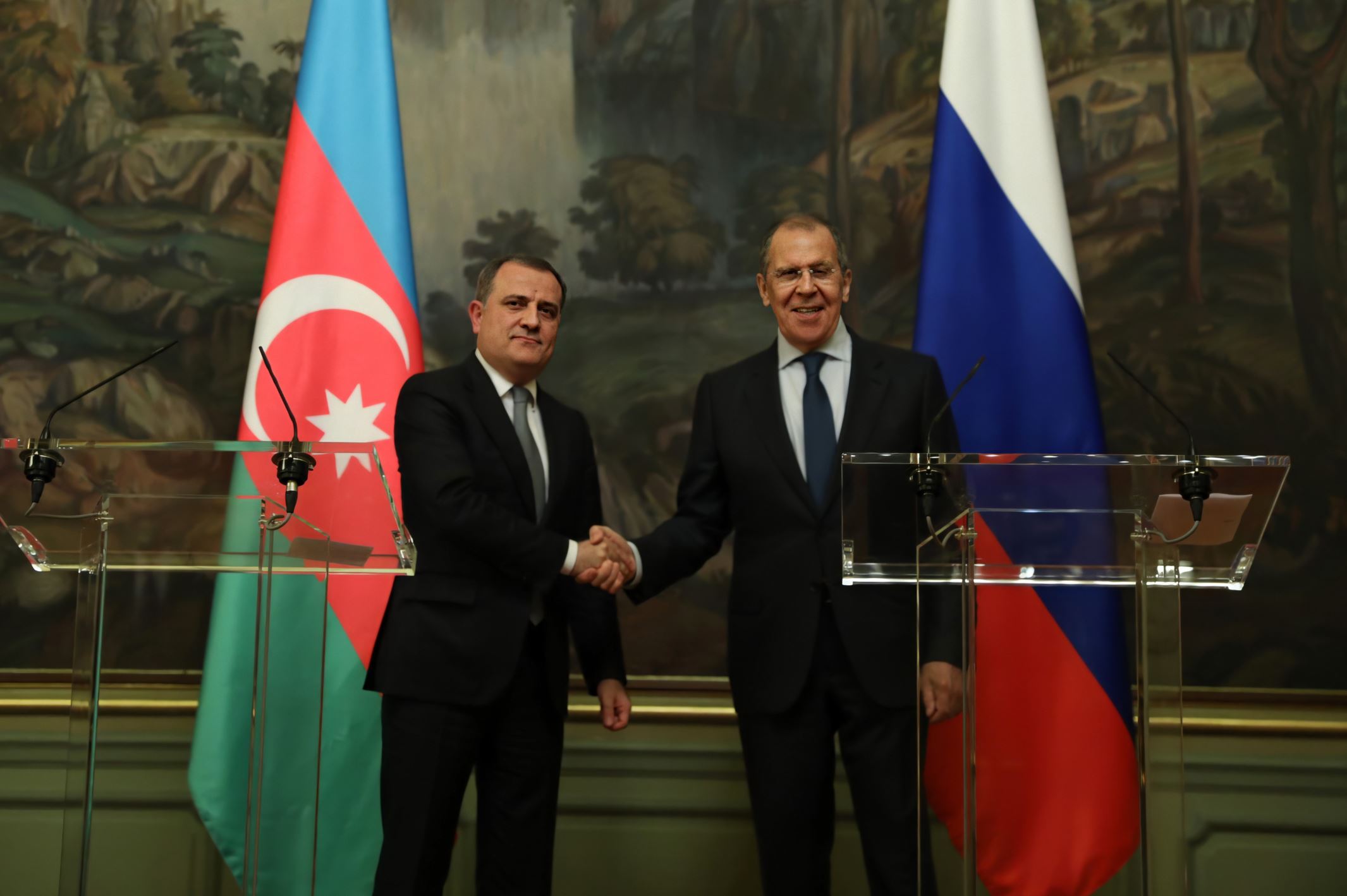
 jamestown.org
jamestown.org
Publication: Eurasia Daily Monitor Volume: 17 Issue: 125
By: Rahim Rahimov
Jamestown.org
September 11, 2020 04:59 PM Age: 2 weeks


Azerbaijani Foreign Minister Jeyhun Bayramov and his Russian counterpart, Sergei Lavrov (Source: mid.ru)
The Kremlin’s website reported, on August 12, that Azerbaijani President Ilham Aliyev had initiated a phone call to congratulate Vladimir Putin on the Russian vaccine against COVID-19 and to discuss bilateral issues. The next day, however, in a wholly unprecedented move, Aliyev’s press service sharply refuted the Russian version: “[T]he main purpose of the phone call was to clarify this issue” concerning “the intensity of delivery of military cargo from Russia to Armenia” since July 17, amidst the border clashes between Armenia and Azerbaijan. The volume of the military cargo exceeded 400 tons and was transported via the airspaces of Kazakhstan, Turkmenistan, and Iran. Neither government offered any indication as to what Putin’s response to Aliyev’s expressed concerns may have been (Kremlin.ru, August 12; President.az, August 13).
On August 25, Russian Defense Minister Sergei Shoigu visited Baku, where he claimed that the flights had been airlifting “construction materials used in large-scale construction work carried out at the 102nd Russian military base in this country [Armenia],” as well as rotating military personnel. Shoigu’s response was met with derision in Azerbaijan (Mod.gov.az, August 25; Turan.az, August 27; Trend.az, August 29).
In turn, Russian Foreign Minister Sergei Lavrov pointedly declared that the catalyst for the July escalation was “the Armenian side’s decision to reanimate an old border checkpoint located 15 kilometers from Azerbaijani [oil and natural gas] export pipelines,” thus essentially echoing Azerbaijan’s narrative that Armenia had provoked the clash. Nonetheless, for Baku, Shoigu’s and Lavrov’s statements represented another Russian attempt to appease Azerbaijan with words but without matching deeds. Indeed, the observed military deliveries to Armenia continued, exceeding 510 tons even after Baku raised its objections with Moscow (Mid.ru, August 21; Musavat.az, August 24).
Azerbaijani media outlets, parliamentarians, experts and state officials jumped on the bandwagon to denounce Russia’s behavior in relation to the Karabakh conflict in unusually explicit terms. Some expressed appreciation for Tbilisi’s refusal to allow for the transit, hence compelling Moscow to take a more circuitous, 2,000-kilometer-long route, rather than a more direct, 500-kilometer route flying over Georgian territory. But the countries that allowed the Russian overflights were largely ignored. The military aircraft also made trips between Yerevan and Kuwait/Syria. The Syrian flights sparked particular uproar in Baku, leading to claims they were being conducted to engage in illegal arms sales and the resettlement of Middle Eastern Armenians in Karabakh. Other Azerbaijani commentators, however, argued that the ethnic-Armenian refugees would not have been interested in relocation from one conflict zone to another. Therefore, some suggested that Syria’s and Lebanon’s Armenians were being transferred to join the Armenian Armed Forces as the country suffers from demographic decline and a related shortage of soldiers. This claim drew inspiration from Yerevan’s recent draft law to form a 100,000-strong voluntary army as well as the Armenian government’s actual policy to resettle Lebanese-based and other Armenians in the country (Aztv.az, Kommersant, Jam-news.net, September 1; Trend.az, September 2 EurasiaNet, September 3; Day.az, August 7; Baku.ws, Qafqazinfo.az, August 14; Tert.am, August 25).
In response, the popular Russian newspaper Nezavisimaya Gazeta published an article titled “Syrian Fighters in Azerbaijan Prepare for Blitzkrieg Against Armenia,” full of allegations against Baku (Nezavisimaya Gazeta, September 1). Such mutual accusations symptomize the seriousness of the current tensions between Baku and Moscow, which also reverberated in exchanged remarks between the Azerbaijani and Russian foreign ministers in Moscow on August 26.
Namely, Azerbaijani Foreign Minister Jeyhun Bayramov called on Russia to press Armenia to live up to its obligations under the United Nations Security Council resolutions and de-occupy Azerbaijani territories. But Lavrov deflected by asserting that the “immediate task” of those UN resolutions had been “to stop the war then.” He also stated that the Minsk Group co-chairs will not write a scenario for the conflict settlement but only facilitate a positive atmosphere for the negotiations, leaving it to Armenia and Azerbaijan to settle their differences on mutually agreed terms (Mid.ru, August 26). Russian expert Stanislav Tarasov termed Lavrov’s remarks a “diplomatic attack” against Baku. Though, Russian scholar Sergey Markedonov clarifies that the Kremlin is not interested in actively “push[ing] Baku” unless Azerbaijan chooses “Euro-Atlantic solidarity” or “escape from Russia” (Regnum, September 1; Carnegie.ru, July 21).
Several possible contributing factors explain the present diplomatic downturn along the Moscow-Baku axis. These factors are interrelated and not mutually exclusive. First and foremost, Turkey and Azerbaijan held massive military exercises in response to Russian-Armenian drills following the July clashes (see EDM, August 14). And those exercises were followed by pronouncements and rallies in Baku urging the Turkish military to create permanent bases in the country, worrying Moscow. Second, Russia’s arms sales to the South Caucasus’s largest importer, Azerbaijan, have decreased in recent years, in favor of purchases from Israel and Turkey. Ankara’s share is set to continue to rise due to the Russian-made equipment’s reported ineffectiveness, in Syria and Libya, against “game-changing” Turkish drones and electronic warfare technology. Third, Azerbaijan has overtaken Russia as the top gas supplier to the Turkish market (see EDM, July 6). This competition with Gazprom will soon be extended to Southeastern Europe with the looming inauguration of the Trans-Adriatic Pipeline, the final segment of the Southern Gas Corridor (see EDM, January 30, 2017 and July 22, 2020; Wilsoncenter.org, September 3; Pressklub.az, August 28; Sipri.org, March 9). Fourth, Baku is frustrated with Moscow’s de facto lack of neutrality regarding the Karabakh conflict. Azerbaijan had, perhaps naively, expected a more even-handed Russian approach because of the perception that the Kremlin holds antipathy toward Armenian Prime Minister Nikol Pashinyan and his Velvet Revolution. And fifth, recent Azerbaijani cabinet reshuffles dismissed the head of the presidential administration, Ramiz Mehdiyev, widely depicted as “the leader of pro-Russian forces” in Baku, along with other figures in his circle (see EDM, September 18, 2018 and December 11, 2019; Qafqazinfo.az, September 2; Science.gov.az, August 25).
Moscow is well aware that the newly appointed Azerbaijani minister of foreign affairs and presidential aide on foreign policy were tasked by Aliyev with more forcefully communicating the country’s positions (APA, July 15; TASS, August 25; Kommersant, August 27). And as such, the Russian side considers these top Azerbaijani diplomats to be acting more as high-level messengers than foreign policy chiefs in their own right. It remains to be seen whether Baku’s hardened rhetoric vis-à-vis the Kremlin foreshadows a qualitative change in Azerbaijani foreign policy or if it epitomizes another episodic, reactive and tactical shift in its dealings with Moscow. For now, the latter scenario looks more likely, if for no other reason than that the former would require the adoption of an entirely new long-term strategy.

Azerbaijani President Rebukes Putin Over Russian Military Cargo Deliveries to Armenia
The Kremlin’s website reported, on August 12, that Azerbaijani President Ilham Aliyev had initiated a phone call to congratulate Vladimir Putin on the Russian vaccine against COVID-19 and to discuss bilateral issues. The next day, however, in a wholly unprecedented move, Aliyev’s press service...
Last edited:
night driver
ESFP adrift in INTJ sea
Call me lazy if ya want. I'll wear that scarlet "L" for this.
I don't usually fall into a thread Quite this late in the game.
Can I get a review of the bidding as to where things are, who has what and who is leading??
I don't usually fall into a thread Quite this late in the game.
Can I get a review of the bidding as to where things are, who has what and who is leading??
Texican
Live Free & Die Free.... God Freedom Country....
Call me lazy if ya want. I'll wear that scarlet "L" for this.
I don't usually fall into a thread Quite this late in the game.
Can I get a review of the bidding as to where things are, who has what and who is leading??
Armenia and Azerbaijan are fighting a war with others involved.
Or,
You could start at page 1 and spend an hour of two catching up.
Texican....
northern watch
TB Fanatic
Call me lazy if ya want. I'll wear that scarlet "L" for this.
I don't usually fall into a thread Quite this late in the game.
Can I get a review of the bidding as to where things are, who has what and who is leading??
I would not call you late, we are only 8 pages into this, it could all blow over tomorrow or we are on the road to a major war
TxGal
Day by day
I would not call you late, we are only 8 pages into this, it could all blow over tomorrow or we are on the road to a major war
We can only hope and pray, but this is looking really ugly. You're doing a great job of keeping up with this rapidly unfolding tinderbox.
bobfall2005
Veteran Member
Did some digging. Israel does value it's relationship with az. Az prefers israeli weapons over Turkish weapons. But there is a split in Israel.
naegling62
Veteran Member
Call me lazy if ya want. I'll wear that scarlet "L" for this.
I don't usually fall into a thread Quite this late in the game.
Can I get a review of the bidding as to where things are, who has what and who is leading??
From Wikipedia:
The present conflict began in 1988, when the Karabakh Armenians demanded that Karabakh be transferred from Soviet Azerbaijan to Soviet Armenia. The conflict escalated into a full-scale war in the early 1990s. ... A four-day escalation in April 2016 became the deadliest ceasefire violation to date.
Now enter today's date and you're cought up.
“This is a life-and-death war,” Arayik Harutyunyan, the Nagorno-Karabakh leader, told a briefing.
As opposed to a "scratch and dent war"?

Ragnarok
On and On, South of Heaven
Did some digging. Israel does value it's relationship with az. Az prefers israeli weapons over Turkish weapons. But there is a split in Israel.
They'd be fools to align with the Muslims over the Armenians
They'd be fools to align with the Muslims over the Armenians
The more we see Turkish involvement via Syrian proxies, never mind the reports of the TuAF running strikes, the less likely IMHO we're going to see the Israelis stay active in any way in Azerbaijan.
northern watch
TB Fanatic
Russia’s Kavkaz 2020: International Participation and Regional Security Implications
Publication: Eurasia Daily Monitor Volume: 17 Issue: 126
By: John C. K. Daly
Jamestown.org
September 14, 2020 04:12 PM Age: 2 weeks
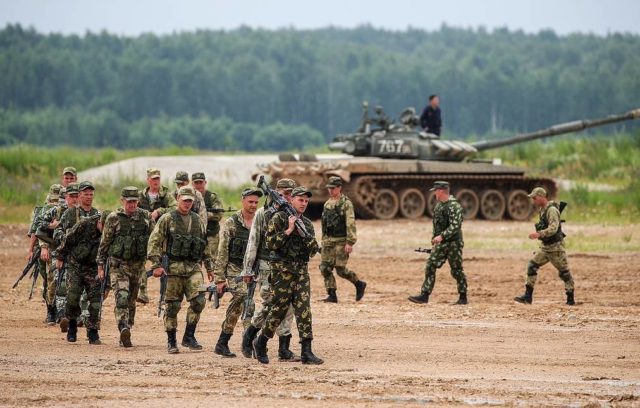

(Source: TASS)
Despite some disruptions to this year’s military training schedule caused by the COVID-19 pandemic (see EDM, April 21, 22), the Russian Armed Forces are preparing to hold their annual capstone strategic-operational exercise on September 15–26. “Kavkaz 2020” (“Caucasus 2020”) will feature large-scale drills spread across the southern Astrakhan region, Prudboi, Ashuluk, Kapustin Yar, Nikolo-Aleksandrovskii and several air-training grounds. According to Russian Defense Minister Sergei Shoigu, “The [Kavkaz 2020] exercise will assess the ability of the Southern Military District to ensure military security in the southwest of the Russian Federation” (Vestnik Kavkaza, September 8).
The latest Kavkaz exercise promises to be a multinational endeavor. Beyond Russia and fellow Shanghai Cooperation Organization (SCO) members China, Pakistan, Kazakhstan, Kyrgyzstan, Tajikistan and Uzbekistan, additional foreign participants reportedly will include Mongolia, Syria, Iran, Egypt, Belarus, Turkey, Armenia, Turkmenistan and even Myanmar (RBC, September 6). India, initially scheduled to take part with 200 troops, ultimately dropped out on the excuse that Pakistan and China were included (Swarajya, August 30). On September 5, Azerbaijan backed out as well (APA, September 5). Baku gave no official reason for its withdrawal from the Russian-led drills (Facebook.com/NewsofAzerbaijan, September 6); though, bilateral relations have recently been under serious strain over Azerbaijan’s anger at Russian military transport flights to Armenia in the midst of Azerbaijani-Armenian border clashes (see EDM, September 11). Despite its decision not to participate in Kavkaz 2020, Azerbaijan will, nonetheless, send two military observers to attend the maneuvers (TASS, September 5).
The fact of an inclusion of such a broad Middle Eastern contingent during Kavkaz 2020—Syria, Iran and Egypt, alongside North Atlantic Treaty Organization (NATO) member Turkey—is noteworthy in itself. But equally striking is Turkmenistan’s participation, given its internationally recognized neutrality status. It is likely that Ashgabat felt compelled to take part this year due to a perceived need to cultivate warm relations with Moscow as the negative health and economic impacts of the coronavirus pandemic take their toll on Turkmenistan and the stability of its government (see EDM, July 21). In mid-August, Russian President Vladimir Putin sent to the parliament for ratification a 2003 signed bilateral agreement on boosting security cooperation for ten years (Trend, August 19). In 2017, Putin and his Turkmenistani counterpart, Gurbanguly Berdimuhamedov, signed an agreement boosting bilateral ties to the level of a “strategic partnership,” which was mutually ratified the following year (Mid.ru, August 11, 2018).
Shoigu announced that the exercises will be held across the Southern Military District; beyond the Astrakhan region, the maneuvers will also occur at the Kapustin Yar and Ashuluk military ranges, with naval deployments on the Black Sea and the Caspian (Vestnik Kavkaza, September 8). The most intriguing element of the initial press reports about the exercise is that, in addition to a land forces contingent, China is additionally sending a three-ship naval deployment to Kavkaz 2020 (Swarajya, August 30). Given Astrakhan’s geographical position near the mouth of the Volga on the Caspian, unless the People’s Liberation Army Navy limits its deployments to the Black Sea, the only possible way that Chinese maritime elements could participate in Caspian operations is by using the Volga-Don Canal, an internal waterway under Russian sovereign control. In 2018, the Volga-Don Canal’s value as a strategic asset was emphasized when the Russian navy’s Caspian Flotilla used the waterway to dispatch a number of smaller vessels into the Sea of Azov in order to raise the pressure on Ukraine (TV Zvezda, April 26, 2018; see EDM, May 31, 2018, June 28, 2018, November 27, 2018). The Volga-Don Canal’s utility as a naval asset is limited, however, by its depth, which prohibits ships above 5,000 tons from transiting the channel, which has led the Russian government to consider various projects for widening and deepening (or potentially replacing) the waterway (RIA Novosti, July 27, 2012; see EDM, August 6, 2020).
Earlier this summer, a retired senior United States military official ascribed sinister possible motives to Kavkaz 2020. In an exclusive interview with LB.ua, the former commander of US Army Europe, General Ben Hodges, stated his conviction that Russia intended to gain full control of Ukraine’s Black Sea coast from Odesa to Kerch and that Russia, “under the cover” of the Kavkaz 2020 exercise, might try to seize a portion of Ukraine’s hydraulic infrastructure in the Kherson region, adjacent to the North Crimea Canal (LB.ru, July 3). Prior to 2014, Ukraine provided up to 85 percent of Crimea’s fresh water via the North Crimean Canal, running from the Dnipro River, before shutting off this supply in response to Russia’s annexation of the peninsula. Hodges’ concerns are shared by the commander of the Ukrainian Naval Forces, Admiral Oleksiy Neizhpapa, who does not rule out that Russian troops could try to break through to Ukraine’s Kherson region from Crimea to secure water resources for the drought-stricken occupied territory (Tsn.ua, July 7; see EDM, May 21, June 2, August 12).
Unsurprisingly, the Russian military presents the Kavkaz 2020 “strategic command-and-staff exercise” in a different, nonaggressive light, while asserting that it is being held as the US and NATO conduct active large-scale maneuvers near its borders in countries that were previously Soviet republics. Lieutenant General (ret.) Yuri Netkachev observed about the increasingly confrontational context, “What is alarming is that first, the concentration of the Alliance’s forces is happening on the territories of post-Soviet countries, in Ukraine and Georgia” (Nezavisimaya Gazeta, September 6).
Kavkaz 2020 is Russian military’s largest international exercise in many years. The Russian defense ministry estimates that roughly 150,000 military personnel will participate (Defence Aviation Post, September 4). Broadening the military exercise’s itinerary, Defense Minister Shoigu announced, on September 4, that defense ministers from the SCO, the Commonwealth of Independent States (CIS) and the Collective Security Treaty Organization (CSTO) had agreed to expand cooperation in the fight against terrorism, with the first joint exercises in this regard being held as part of the Kavkaz 2020 maneuvers (Kommersant, September 4, 2020. Thus, after the dust settles and the participating units return to their home countries, this terrorism agreement may well prove to be Kavkaz 2020’s most lasting legacy for the Eurasian region.
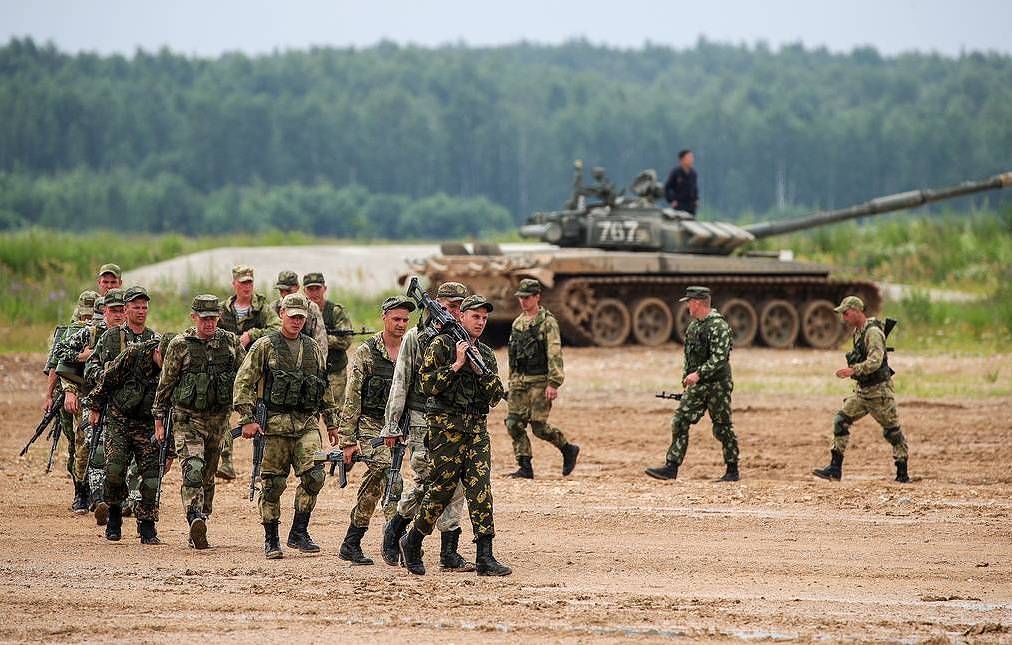
 jamestown.org
jamestown.org
Publication: Eurasia Daily Monitor Volume: 17 Issue: 126
By: John C. K. Daly
Jamestown.org
September 14, 2020 04:12 PM Age: 2 weeks


(Source: TASS)
Despite some disruptions to this year’s military training schedule caused by the COVID-19 pandemic (see EDM, April 21, 22), the Russian Armed Forces are preparing to hold their annual capstone strategic-operational exercise on September 15–26. “Kavkaz 2020” (“Caucasus 2020”) will feature large-scale drills spread across the southern Astrakhan region, Prudboi, Ashuluk, Kapustin Yar, Nikolo-Aleksandrovskii and several air-training grounds. According to Russian Defense Minister Sergei Shoigu, “The [Kavkaz 2020] exercise will assess the ability of the Southern Military District to ensure military security in the southwest of the Russian Federation” (Vestnik Kavkaza, September 8).
The latest Kavkaz exercise promises to be a multinational endeavor. Beyond Russia and fellow Shanghai Cooperation Organization (SCO) members China, Pakistan, Kazakhstan, Kyrgyzstan, Tajikistan and Uzbekistan, additional foreign participants reportedly will include Mongolia, Syria, Iran, Egypt, Belarus, Turkey, Armenia, Turkmenistan and even Myanmar (RBC, September 6). India, initially scheduled to take part with 200 troops, ultimately dropped out on the excuse that Pakistan and China were included (Swarajya, August 30). On September 5, Azerbaijan backed out as well (APA, September 5). Baku gave no official reason for its withdrawal from the Russian-led drills (Facebook.com/NewsofAzerbaijan, September 6); though, bilateral relations have recently been under serious strain over Azerbaijan’s anger at Russian military transport flights to Armenia in the midst of Azerbaijani-Armenian border clashes (see EDM, September 11). Despite its decision not to participate in Kavkaz 2020, Azerbaijan will, nonetheless, send two military observers to attend the maneuvers (TASS, September 5).
The fact of an inclusion of such a broad Middle Eastern contingent during Kavkaz 2020—Syria, Iran and Egypt, alongside North Atlantic Treaty Organization (NATO) member Turkey—is noteworthy in itself. But equally striking is Turkmenistan’s participation, given its internationally recognized neutrality status. It is likely that Ashgabat felt compelled to take part this year due to a perceived need to cultivate warm relations with Moscow as the negative health and economic impacts of the coronavirus pandemic take their toll on Turkmenistan and the stability of its government (see EDM, July 21). In mid-August, Russian President Vladimir Putin sent to the parliament for ratification a 2003 signed bilateral agreement on boosting security cooperation for ten years (Trend, August 19). In 2017, Putin and his Turkmenistani counterpart, Gurbanguly Berdimuhamedov, signed an agreement boosting bilateral ties to the level of a “strategic partnership,” which was mutually ratified the following year (Mid.ru, August 11, 2018).
Shoigu announced that the exercises will be held across the Southern Military District; beyond the Astrakhan region, the maneuvers will also occur at the Kapustin Yar and Ashuluk military ranges, with naval deployments on the Black Sea and the Caspian (Vestnik Kavkaza, September 8). The most intriguing element of the initial press reports about the exercise is that, in addition to a land forces contingent, China is additionally sending a three-ship naval deployment to Kavkaz 2020 (Swarajya, August 30). Given Astrakhan’s geographical position near the mouth of the Volga on the Caspian, unless the People’s Liberation Army Navy limits its deployments to the Black Sea, the only possible way that Chinese maritime elements could participate in Caspian operations is by using the Volga-Don Canal, an internal waterway under Russian sovereign control. In 2018, the Volga-Don Canal’s value as a strategic asset was emphasized when the Russian navy’s Caspian Flotilla used the waterway to dispatch a number of smaller vessels into the Sea of Azov in order to raise the pressure on Ukraine (TV Zvezda, April 26, 2018; see EDM, May 31, 2018, June 28, 2018, November 27, 2018). The Volga-Don Canal’s utility as a naval asset is limited, however, by its depth, which prohibits ships above 5,000 tons from transiting the channel, which has led the Russian government to consider various projects for widening and deepening (or potentially replacing) the waterway (RIA Novosti, July 27, 2012; see EDM, August 6, 2020).
Earlier this summer, a retired senior United States military official ascribed sinister possible motives to Kavkaz 2020. In an exclusive interview with LB.ua, the former commander of US Army Europe, General Ben Hodges, stated his conviction that Russia intended to gain full control of Ukraine’s Black Sea coast from Odesa to Kerch and that Russia, “under the cover” of the Kavkaz 2020 exercise, might try to seize a portion of Ukraine’s hydraulic infrastructure in the Kherson region, adjacent to the North Crimea Canal (LB.ru, July 3). Prior to 2014, Ukraine provided up to 85 percent of Crimea’s fresh water via the North Crimean Canal, running from the Dnipro River, before shutting off this supply in response to Russia’s annexation of the peninsula. Hodges’ concerns are shared by the commander of the Ukrainian Naval Forces, Admiral Oleksiy Neizhpapa, who does not rule out that Russian troops could try to break through to Ukraine’s Kherson region from Crimea to secure water resources for the drought-stricken occupied territory (Tsn.ua, July 7; see EDM, May 21, June 2, August 12).
Unsurprisingly, the Russian military presents the Kavkaz 2020 “strategic command-and-staff exercise” in a different, nonaggressive light, while asserting that it is being held as the US and NATO conduct active large-scale maneuvers near its borders in countries that were previously Soviet republics. Lieutenant General (ret.) Yuri Netkachev observed about the increasingly confrontational context, “What is alarming is that first, the concentration of the Alliance’s forces is happening on the territories of post-Soviet countries, in Ukraine and Georgia” (Nezavisimaya Gazeta, September 6).
Kavkaz 2020 is Russian military’s largest international exercise in many years. The Russian defense ministry estimates that roughly 150,000 military personnel will participate (Defence Aviation Post, September 4). Broadening the military exercise’s itinerary, Defense Minister Shoigu announced, on September 4, that defense ministers from the SCO, the Commonwealth of Independent States (CIS) and the Collective Security Treaty Organization (CSTO) had agreed to expand cooperation in the fight against terrorism, with the first joint exercises in this regard being held as part of the Kavkaz 2020 maneuvers (Kommersant, September 4, 2020. Thus, after the dust settles and the participating units return to their home countries, this terrorism agreement may well prove to be Kavkaz 2020’s most lasting legacy for the Eurasian region.

Russia’s Kavkaz 2020: International Participation and Regional Security Implications
Despite some disruptions to this year’s military training schedule caused by the COVID-19 pandemic (see EDM, April 21, 22), the Russian Armed Forces are preparing to hold their annual capstone strategic-operational exercise on September 15–26. “Kavkaz 2020” (“Caucasus 2020”) will feature...
northern watch
TB Fanatic
Azerbaijan, Turkey Hold Large-Scale Military Drills Amidst Escalation of Tensions With Armenia
Publication: Eurasia Daily Monitor Volume: 17 Issue: 121
By: Vasif Huseynov
Jamestown.org
August 14, 2020 03:19 PM Age: 2 months
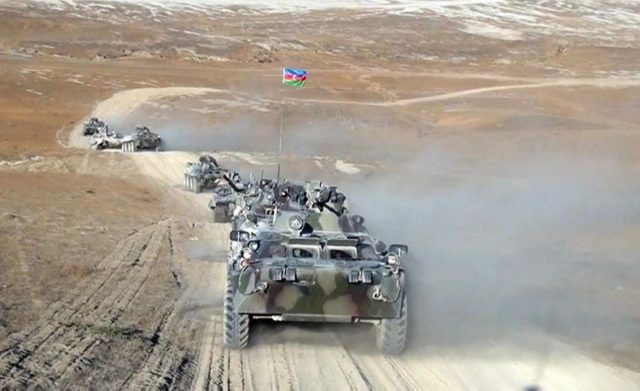

(Source: APA)
On July 29, Azerbaijan and Turkey launched a two-week long round of joint military exercises with the participation of ground and air forces from both countries. The military drills involving land forces were held from August 1 to 5, in Baku and Nakhchivan; while the exercises with the participation of military aviation occurred between July 29 and August 10, in Baku, Nakhchivan, Ganja, Kurdamir and Yevlakh (Mod.gov.az, July 27, 30). The goal of these maneuvers was to test the combat readiness of Azerbaijani and Turkish troops to fulfill joint operations, their ability to act quickly in certain situations, to clarify issues of cooperation between the staffs, and to conduct fire management exercises (Azeridefence.com, August 2).
The recently concluded bilateral exercises were held under the legal framework established by the 2010 Agreement on Strategic Partnership and Mutual Support (ASPMS) between Turkey and Azerbaijan. This agreement includes, among others, the casus foederis principle, which obligates both parties, in line with Article 51 of the United Nations Charter, to cooperate when either country faces aggression from a third state or group of states (E-qanun.az, December 21, 2010). In accordance with the ASPMS—which is expected to be renewed for another ten years this month—the two allies have held increasingly more intensive and numerous military drills each year. For instance, up to 13 exercises involving the armed forces of both countries were organized in 2019, while there were only 7 such joint drills in 2018 (see EDM, July 11, 2019).
Compared to previous years, however, the latest joint exercises took place against the background of an exceptional regional situation caused by the sudden flare-up on the border between Armenia and Azerbaijan on July 12 (see EDM, July 14). Moreover, on the heels of the clashes between the two South Caucasus rivals, Russia held its own large-scale snap combat readiness checks of the troops of the Southern and Western military districts on July 17–22. Moscow’s impromptu maneuvers were officially declared to be a “major part of preparations for the Kavkaz 2020 [Caucasus 2020] strategic command and staff exercise,” planned for early fall, and ostensibly to have no connection to the Armenian-Azerbaijani border clashes (TASS, July 18; see EDM, July 23).
The day after Russia’s military drills ended, on July 23, the Armenian Ministry of Defense reported that it was holding military exercises together with Russia involving the commanders of the Russo-Armenian air-defense system, separate anti-aircraft units of the Armenian army as well as air force officers from both countries. According to the ministry, the particular objective of the exercises was to develop new ways of fighting against unmanned aerial vehicles (UAV), which were intensively employed in both the Armenian-Azerbaijani April 2016 “Four-Days War” and the July fighting this year (Asbarez, July 24).
Against this background of strained tensions in the region, on July 16, Azerbaijani deputy minister of defense and the commander of the Air Force, Lieutenant General Ramiz Tahirov, as well as the army commander of the Nakhchivan Autonomous Republic, Kerem Mustafayev, paid a visit to Turkey and met with top Turkish military brass (Defence.az, July 16). Reportedly, the sides discussed the situation between Armenia and Azerbaijan, military cooperation between the two Turkic states, and probably also joint military exercises (Anadoly Agency, Defence.az, July 17). Azerbaijan’s Ministry of Defense stated that the exercises would be held “according to the annual plan” of the ASPMS, but did not explicitly deny its relation with the July 12 border clashes in Tovuz province (Mod.gov.az, July 27).
Turkey appears ready to transfer to Azerbaijan the experience it has accumulated in the use of attack drones, multiple-launch rocket systems (MLRS) and air-defense systems over the last several years. Moreover, Ankara seems determined to broaden the geography of its rise as an influential regional player (Yeni Safak, August 4; Nezavisimaya Gazeta, July 28). Its 13-day military exercises with Azerbaijan, involving military personnel, armored vehicles, artillery mounts, and mortars, as well as military aviation and air-defense equipment, are the largest of its kind in the recent history of military cooperation between the two countries.
The Azerbaijani media reported that up to 11,000 military service members of the Turkish army arrived in Azerbaijan to attend the drills, but there has been no official confirmation about the true size of the Turkish contingent (Modern.az, August 1). Russia’s Nezavisimaya Gazeta reports that no more than a Turkish battalion tactical group of up to 1,000 service members can be concentrated in the garrisons of the Nakhchivan Separate Combined Arms Army. Though, the Russian daily adds that, according to tactical standards, these troops can be reinforced with MLRS and strike aircraft, which are capable of hitting any targets in Armenia (Nezavsimaya Gazeta, July 28).
Earlier this year, Azerbaijan’s defense ministry featured a video showing Turkish-manufactured MLRS batteries, including the latest variant of the 300-millimeter TRG-300 Kaplan (Tiger), stationed in Nakhchivan (see EDM, May 18). On July 31, Turkish F-16 jets were also brought to Azerbaijan to take part in an aviation exercise named TurAz Eagle 2020 (Mod.gov.az, July 31).
The Azerbaijani-Turkish drills caused considerable anxiety in Armenia. Meeting with the ambassadors of France and Russia as well as Iran’s newly appointed envoy to Yerevan, Armenia’s Defense Minister David Tonoyan said that his government would be monitoring the scheduled military drills by Turkey and Azerbaijan (Asbarez, July 29). While praising the military partnership between Armenia and Russia and organizing joint military exercises with the Russian army, Tonoyan described Azerbaijan’s military drills with North Atlantic Treaty Organization (NATO) member Turkey as “destabilizing” for the region (Asbarez, July 29).
It is not known yet how the military drills will affect the balance of power in the region, and especially the three-decade-old conflict between Armenia and Azerbaijan that started in the early 1990s. The failure of negotiations brokered by the Organization for Security and Cooperation in Europe’s (OSCE) Minsk Group, co-chaired by Russia, France and the United States, is widely perceived as an important factor in the further intensification of the conflict. And the implications extend far beyond the region since “information warfare” linked to July’s border clashes has already spilled over to the diasporas in third countries (APA, July 21; Lragir.am, July 23; Contact.az, July 31).
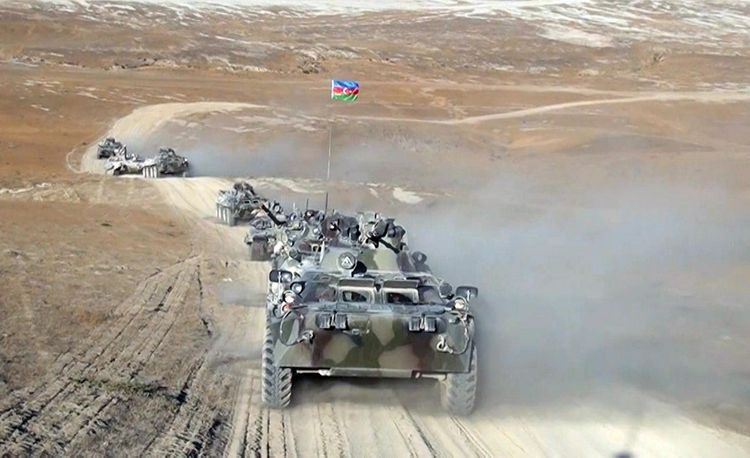
 jamestown.org
jamestown.org
Publication: Eurasia Daily Monitor Volume: 17 Issue: 121
By: Vasif Huseynov
Jamestown.org
August 14, 2020 03:19 PM Age: 2 months


(Source: APA)
On July 29, Azerbaijan and Turkey launched a two-week long round of joint military exercises with the participation of ground and air forces from both countries. The military drills involving land forces were held from August 1 to 5, in Baku and Nakhchivan; while the exercises with the participation of military aviation occurred between July 29 and August 10, in Baku, Nakhchivan, Ganja, Kurdamir and Yevlakh (Mod.gov.az, July 27, 30). The goal of these maneuvers was to test the combat readiness of Azerbaijani and Turkish troops to fulfill joint operations, their ability to act quickly in certain situations, to clarify issues of cooperation between the staffs, and to conduct fire management exercises (Azeridefence.com, August 2).
The recently concluded bilateral exercises were held under the legal framework established by the 2010 Agreement on Strategic Partnership and Mutual Support (ASPMS) between Turkey and Azerbaijan. This agreement includes, among others, the casus foederis principle, which obligates both parties, in line with Article 51 of the United Nations Charter, to cooperate when either country faces aggression from a third state or group of states (E-qanun.az, December 21, 2010). In accordance with the ASPMS—which is expected to be renewed for another ten years this month—the two allies have held increasingly more intensive and numerous military drills each year. For instance, up to 13 exercises involving the armed forces of both countries were organized in 2019, while there were only 7 such joint drills in 2018 (see EDM, July 11, 2019).
Compared to previous years, however, the latest joint exercises took place against the background of an exceptional regional situation caused by the sudden flare-up on the border between Armenia and Azerbaijan on July 12 (see EDM, July 14). Moreover, on the heels of the clashes between the two South Caucasus rivals, Russia held its own large-scale snap combat readiness checks of the troops of the Southern and Western military districts on July 17–22. Moscow’s impromptu maneuvers were officially declared to be a “major part of preparations for the Kavkaz 2020 [Caucasus 2020] strategic command and staff exercise,” planned for early fall, and ostensibly to have no connection to the Armenian-Azerbaijani border clashes (TASS, July 18; see EDM, July 23).
The day after Russia’s military drills ended, on July 23, the Armenian Ministry of Defense reported that it was holding military exercises together with Russia involving the commanders of the Russo-Armenian air-defense system, separate anti-aircraft units of the Armenian army as well as air force officers from both countries. According to the ministry, the particular objective of the exercises was to develop new ways of fighting against unmanned aerial vehicles (UAV), which were intensively employed in both the Armenian-Azerbaijani April 2016 “Four-Days War” and the July fighting this year (Asbarez, July 24).
Against this background of strained tensions in the region, on July 16, Azerbaijani deputy minister of defense and the commander of the Air Force, Lieutenant General Ramiz Tahirov, as well as the army commander of the Nakhchivan Autonomous Republic, Kerem Mustafayev, paid a visit to Turkey and met with top Turkish military brass (Defence.az, July 16). Reportedly, the sides discussed the situation between Armenia and Azerbaijan, military cooperation between the two Turkic states, and probably also joint military exercises (Anadoly Agency, Defence.az, July 17). Azerbaijan’s Ministry of Defense stated that the exercises would be held “according to the annual plan” of the ASPMS, but did not explicitly deny its relation with the July 12 border clashes in Tovuz province (Mod.gov.az, July 27).
Turkey appears ready to transfer to Azerbaijan the experience it has accumulated in the use of attack drones, multiple-launch rocket systems (MLRS) and air-defense systems over the last several years. Moreover, Ankara seems determined to broaden the geography of its rise as an influential regional player (Yeni Safak, August 4; Nezavisimaya Gazeta, July 28). Its 13-day military exercises with Azerbaijan, involving military personnel, armored vehicles, artillery mounts, and mortars, as well as military aviation and air-defense equipment, are the largest of its kind in the recent history of military cooperation between the two countries.
The Azerbaijani media reported that up to 11,000 military service members of the Turkish army arrived in Azerbaijan to attend the drills, but there has been no official confirmation about the true size of the Turkish contingent (Modern.az, August 1). Russia’s Nezavisimaya Gazeta reports that no more than a Turkish battalion tactical group of up to 1,000 service members can be concentrated in the garrisons of the Nakhchivan Separate Combined Arms Army. Though, the Russian daily adds that, according to tactical standards, these troops can be reinforced with MLRS and strike aircraft, which are capable of hitting any targets in Armenia (Nezavsimaya Gazeta, July 28).
Earlier this year, Azerbaijan’s defense ministry featured a video showing Turkish-manufactured MLRS batteries, including the latest variant of the 300-millimeter TRG-300 Kaplan (Tiger), stationed in Nakhchivan (see EDM, May 18). On July 31, Turkish F-16 jets were also brought to Azerbaijan to take part in an aviation exercise named TurAz Eagle 2020 (Mod.gov.az, July 31).
The Azerbaijani-Turkish drills caused considerable anxiety in Armenia. Meeting with the ambassadors of France and Russia as well as Iran’s newly appointed envoy to Yerevan, Armenia’s Defense Minister David Tonoyan said that his government would be monitoring the scheduled military drills by Turkey and Azerbaijan (Asbarez, July 29). While praising the military partnership between Armenia and Russia and organizing joint military exercises with the Russian army, Tonoyan described Azerbaijan’s military drills with North Atlantic Treaty Organization (NATO) member Turkey as “destabilizing” for the region (Asbarez, July 29).
It is not known yet how the military drills will affect the balance of power in the region, and especially the three-decade-old conflict between Armenia and Azerbaijan that started in the early 1990s. The failure of negotiations brokered by the Organization for Security and Cooperation in Europe’s (OSCE) Minsk Group, co-chaired by Russia, France and the United States, is widely perceived as an important factor in the further intensification of the conflict. And the implications extend far beyond the region since “information warfare” linked to July’s border clashes has already spilled over to the diasporas in third countries (APA, July 21; Lragir.am, July 23; Contact.az, July 31).

Azerbaijan, Turkey Hold Large-Scale Military Drills Amidst Escalation of Tensions With Armenia
On July 29, Azerbaijan and Turkey launched a two-week long round of joint military exercises with the participation of ground and air forces from both countries. The military drills involving land forces were held from August 1 to 5, in Baku and Nakhchivan; while the exercises with the...


